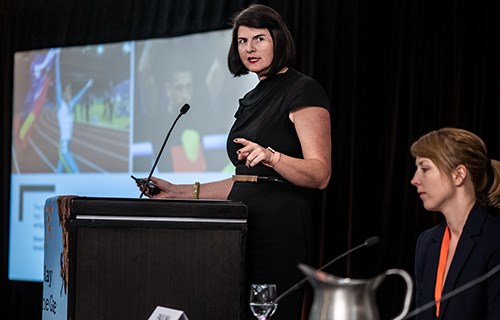Athlete activism: defending the right to protest
Colin Rand Kaepernick, former quarterback with the San Francisco 49ers, made global headlines by kneeling down while his national anthem was played. While some sports fans accused him of being disrespectful, Kaepernick stated that his actions were a protest against police violence and racial injustice. The publicity surrounding his stance not only raised awareness, but also prompted other NFL players and athletes to follow his lead.
Back in the 1960’s athlete activism was relatively common, Todd Franley, Associate Dean of East Carolina University, told Play the Game 2019. Mohammed Ali refused to participate in the draft, while African-American athletes Tommie Smith and John Carlos famously raised their fists during the 1968 Olympics. However, with a few notable exceptions, the 1980s and 90s, did not see the same visibility. Now, fifty years later, Franley said, athletes like Kaepernick are again starting to take a political stance.
While Kaepernick faced strong criticism for his actions, Franley said, this condemnation was important to the conversation. “Backlashes happen when athletes step out of the arena,” he said. “Some will say that they are paid to perform, not offer an opinion. They’re often diminished and undermined, treated as outcasts. But they are now making connections to larger social movements such as #metoo. It’s fuelled to a large extent by social media, which serves to improve connections within the community. This is important. Social media helps to create a sense of togetherness”
Improved connections
Before athletes’ voices can be strengthened, lawyer and former Olympian Nikki Dryden told Play the Game 2019, their human rights need to be secured. In many nations, she pointed out, athletes are still unable to express their opinions freely.
Bahraini professional footballer Hakeem al-Araibi, for example, was arrested and tortured following anti-government protests in 2012. Although he subsequently fled to Australia, his ordeal was not over.
In 2016, he publicly criticised Sheikh Salman, a member of Bahrain's ruling royal family who had aspirations to become FIFA President. In November 2018, al-Araibi was arrested while on vacation in Thailand after Bahrain filed an extradition request with Interpol. He was held in Thailand pending deportation until February 2019, and only released after an international outcry.
Olympic ideals undermined
Dryden called for an overhaul of the Olympic Charter’s Rule 50.2, which outlaws demonstrations or “propaganda” in Olympic sites or venues. “Explicit support for freedom of speech should be contained in the Olympic Charter,” Dryden said “Freedom of expression and assembly are generally-accepted norms in democratic nations and the international community. The Olympic ideals sound like they should protect these rights. But Rule 50.2 prevents freedom of expression .”
Finnish sports writer Juha Kanerva described the reaction to international footballer Riku Riski ‘s refusal of to play in Qatar. In January 2019, the Finnish national soccer team was due to play Sweden and Estonia in friendly matches at the home of the 2022 World Cup hosts. After being was selected for the squad, Riski refused to travel for “ethical reasons”. While his decision was supported by the Finnish team’s head coach, the president of the nation’s Football Association had less sympathy. Because the visiting teams intended to draw attention to human rights issues, he said, Riski decision was “silly”.
Following the Riski controversy, Kanerva said, the Finnish Center for Integrity in Sport urged national teams to pay attention to human rights issues when choosing venues for training camps and friendly games. The Finnish national team’s Supporters Association has urged fans not to travel to Qatar.
Margaret MacNeill, Associate Professor at the University of Toronto, said that the changing role of the media has affected how athlete activism is expressed. Athletes are seen as a commodity,” she told Play the Game 2019. “Athletes sign away their right to free expression by agreeing to social media guidelines. Tweets can trigger lawsuits.” While the emergence of new digital media brings many challenges related to athletes’ rights, she said, it also brings new opportunities for the establishment of athlete-owned media.
MacNeill was then asked whether any limits should be placed on athletes’ freedom of expression and right to protest. “There are limitations on free speech,” she said “Hate speech”. “The right to free expression comes with responsibilities.”
In more than 40 sessions, over 170 speakers will present their thoughts and oponions on a wide range of the most topical questions in world sport during the 11th Play the Game conference, taking place in Colorado Springs, USA, 13-16 October 2019.







